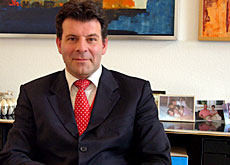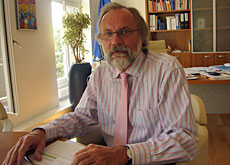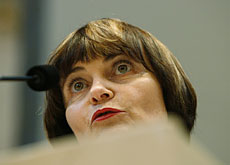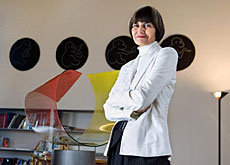“I’m not the Rasputin of foreign affairs”

One of Switzerland's top diplomats, Roberto Balzaretti, talks to swissinfo about the changes, challenges and disappointments he has witnessed as he served his country.
The Swiss president’s chief of staff and key foreign policy advisor is leaving the administration for a job in the banking industry.
Balzaretti, 42, hopes to use his diplomatic qualities in his new post, which he describes as a “great opportunity to enrich my professional knowledge”.
swissinfo: What attracted you to the world of diplomacy and how has an ambassador’s work changed over the years?
Roberto Balzaretti: I was interested in international relations and had a somewhat romantic view of a people who, more interested in public affairs than private ones, are able to contribute to the general wellbeing. Luckily, I wasn’t wrong there. I am convinced that nowadays having a focused foreign policy is essential if you want to defend the interests of the population.
The daily work of an ambassador has changed – we have become specialists permanently in touch with headquarters. Ten years ago a diplomat was the only point of contact between two countries, a person who could decide alone.
Nowadays, news travels at the speed of light and the diplomat is no longer the informer but analyses events. But the job remains essentially the same – understanding what is happening in the country of residence and explaining Switzerland abroad – and defending the interests of our country this way.
swissinfo: What have been the most gratifying moments of your career?
R.B.: There are many. Above all every moment with President Micheline Calmy-Rey, a political personality of distinction who has changed this country’s foreign policy, giving it credibility and visibility.
I was also able to head the legal team of the European Free Trade Association during negotiations with Singapore, Mexico and Chile. This was the first big second-generation agreement on free trade made by Switzerland.
swissinfo: No regrets or disappointments?
R.B.: No regrets. As for disappointments… perhaps the no vote on joining the European Economic Area. It was an agreement wanted by and perfectly suited to Switzerland. I believe that this vote – which I respect – set us back 10-15 years.
swissinfo: Which encounters have left an impression on you?
R.B.: One of the personalities that marked me was former United States president Bill Clinton. He has an incredible charisma – when enters a room, he comes across as casual, almost frivolous, but as soon as he stands in front of a microphone he has the audience’s attention.
The former United Nations secretary-general Kofi Annan, on the other hand, made an impression because he exudes calm. He is an uncomplicated and distinguished person who makes you feel at ease.
swissinfo: You line of work is very formal and demands you stick to protocol. Is a diplomat’s job not too much of straitjacket?
R.B.: I wouldn’t put it like that. It’s very useful to know that there is a convention and a protocol, a way of tackling questions. You can however, express many things within convention. If this protocol didn’t exist, some affirmations could be taken the wrong way, seen as offensive or provoke unhelpful tensions.
Diplomat speak is not troublesome – on the contrary it’s a highly useful tool which allows the most difficult things to be expressed in the most polite and elegant way. The language is adapted to the needs of the person you are talking to. In Asia you cannot be direct. In Russia you… have to be decisive.
swissinfo: In 2007 you became the Swiss president’s chief of staff. How have you managed to make your mark on the decision process?
R.B.: I’d like to underline that I am not the diplomatic advisor to Micheline Calmy-Rey. The whole department takes part in formulating the president’s policy and decisions. My role is that of a personal collaborator – the English say private secretary – who accompanies the president in her thoughts, choices and obligations.
Of course there are more personal moments with the president. There’s a mutual trust that allows me to speak frankly. But I’m not the Rasputin of foreign affairs. Being close to a person in power reflects on you. It’s important to know the limits and not to abuse them.
swissinfo-interview: Luigi Jorio and Andrea Arcidiacono
In 2007, 74 people took part in the selection process to become a diplomat. In the past decade there has been on average 100 applicants and in 2005 and 2006 there were more than 200.
Observers say that while private industry offers rapid career and salary progression, the diplomatic corps’ benefits come after a long while.
Salaries at the start of a diplomatic career are a little under SFr100,000 ($89,000). The highest is around SFr212,000 after around 20 years in the profession.
Roberto Balzaretti was born in 1965 in Ligornetto, canton Ticino. He studied at Bern University, where he took a doctorate in law.
He joined the foreign ministry in 1991. After different postings in Bern and abroad, including Brussels and Washington, the government conferred on him in October 2004 the title of ambassador in his capacity of diplomatic advisor to the foreign minister.
In 2007 Balzaretti was appointed head of cabinet to the President of the Confederation.
He leaves to join Credit Suisse and will be responsible for expanding the bank’s business in the ultra-high net worth segment.
Benedikt Wechsler, who is currently a diplomatic adviser, has been appointed to succeed him.

In compliance with the JTI standards
More: SWI swissinfo.ch certified by the Journalism Trust Initiative




You can find an overview of ongoing debates with our journalists here . Please join us!
If you want to start a conversation about a topic raised in this article or want to report factual errors, email us at english@swissinfo.ch.